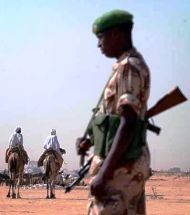INTERVIEW-More robust AU force seen for Darfur
By Opheera McDoom
KHARTOUM, April 27 (Reuters) – An African Union force in Darfur will be given a stronger mandate to protect civilians who face attack in the troubled western Sudanese region, a senior AU official said.

|
|
A Rwandan African Union soldier patrols at Abushouk camp near El Fasher in North Darfur, Nov. 3. (Reuters). |
“The AU mission there will no longer turn its eyes in the event that the civilian population comes under threat,” Sam Ibok, the special representative for AU-sponsored Darfur peace talks, said in an interview late on Tuesday.
“That is why we are having a more robust deployment.”
The AU’s Peace and Security Council meets in Ethiopia on Thursday to discuss doubling the AU force in Darfur to about 6,000 and giving it stronger powers to intervene in the violence in which tens of thousands of people have been killed.
The force currently has orders to monitor a shaky ceasefire signed just more than a year ago, with only limited powers to protect civilians. That would change.
“It means that they will be more proactive in their engagement of these parties (armed groups), not reactive, they will be proactive,” he said.
The AU would increase patrols and focus on areas of potential conflict and where civilians have suffered.
AU monitors have come under fire on many occasions in Darfur, but previously they have withdrawn rather than fighting back. Ibok said their new mandate would give them more power.
“If they are attacked they will respond, there will be a robust response,” he said.
“The way we envisage this force and once it is in place … it will be suicidal for anyone to try (to attack AU soldiers).”
He added the new force should be deployed by September and the mandate would allow it to be boosted if necessary by the end of the year.
Rebels took up arms accusing the Sudanese government of neglect and of preferential treatment of Arab tribes over non-Arabs. The United Nations says Khartoum armed Arab militias, known locally as Janjaweed, to loot and burn non-Arab villages.
Khartoum admits arming some militia to fight the rebels but denies any links to the Janjaweed, calling them outlaws.
ANARCHY IN DARFUR
Ibok said the situation in Darfur was tending towards anarchy, making access by aid agencies and political talks more difficult.
But he said the sheer size and presence of the new force would act as a deterrent to any armed Darfur factions planning attacks.
Ibok said talks, which collapsed in December, were likely to restart in the third week of May, but much depended on rebel movements resolving leadership crises.
The government had also not yet responded to proposals made in February, he said, but Sudan’s humanitarian affairs minister said on Tuesday the government was ready to go to talks next month.
Ibok said rebel preconditions to talks had been met. The government had fully withdrawn from areas occupied during a December offensive, and aerial bombardments had also ceased.
The AU mediator said rebel leaders should be present at the talks and he wanted Sudan’s First Vice President Ali Osman Mohamed Taha to take an active role at decision-making times.
Taha was given the task of dealing with Darfur in January, after he secured a long-awaited peace deal to end more than two decades of civil war in a separate conflict in Sudan’s south.
He was involved directly in talks with the southern rebel leader at a critical time, which speeded up the process.
Ibok said he would like to see the same method applied in Darfur talks.
